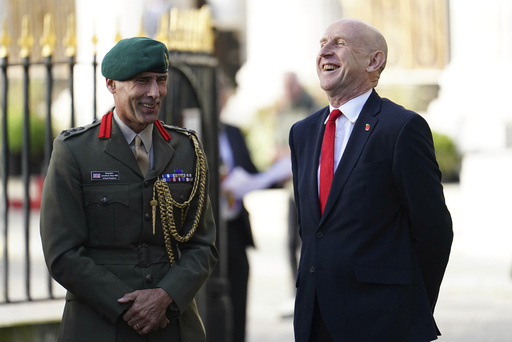
LONDON — In a bid to confront the escalating threat posed by Russia, Britain and Germany have entered a new defense agreement that will see German submarine-hunting aircraft conduct operations in the North Atlantic from a military base in Scotland. This significant pact was formalized by defense ministers from both countries during a signing ceremony held in London on Wednesday, marking the first collaborative defense initiative of its kind between these two NATO member nations aimed at enhancing European security amidst rising tensions from Russia.
The agreement comes in the wake of the ongoing conflict that has ensued following Russia’s extensive invasion of Ukraine, which began in February 2022. Both Ukraine and its European allies remain on high alert, particularly with the impending U.S. presidential election set for November, which adds further uncertainty to the situation. U.K. Defense Secretary John Healey emphasized the urgent need for Europe to strengthen its own security measures and for the U.K. to assume a more influential role within NATO. “This necessity is driving our NATO-first U.K. defense strategy and the re-establishment of U.K. relations with Europe,” he stated.
Healey remarked at a press briefing alongside German Defense Minister Boris Pistorius that “in an increasingly perilous world, our allies constitute our strategic advantage, and we must collaborate more closely.” As outlined in the pact, German aircraft specializing in submarine detection are poised to operate intermittently from a Scottish military base to help safeguard the North Atlantic. Both nations have also committed to working together more diligently in protecting crucial underwater communication cables in the North Sea.
Further components of the agreement include a cooperative effort in the development of advanced long-range strike capabilities, aiming to extend their range beyond the United Kingdom’s current Storm Shadow missiles. German defense conglomerate Rheinmetall is also set to establish a facility in the U.K. dedicated to producing artillery gun components utilizing local steel.
Officials indicated that this agreement will facilitate greater joint exercises and operations between British and German troops stationed in Estonia and Lithuania, reinforcing the presence and readiness of NATO’s eastern flank as a reliable deterrent against potential aggression. In addition, the two nations anticipate collaborating on the creation of new land-based and aerial drone technology as part of their defense enhancements.
Pistorius cautioned against complacency regarding security in Europe, stresses the importance of vigilance and preparedness. “Russia continues its warfare against Ukraine, significantly ramping up its armament production and repeatedly launching hybrid assaults on our eastern European partners.” He added that through the Trinity House Agreement, NATO allies are demonstrating an awareness of the current geopolitical landscape and a firm commitment to advancing their defense and deterrent capabilities.
